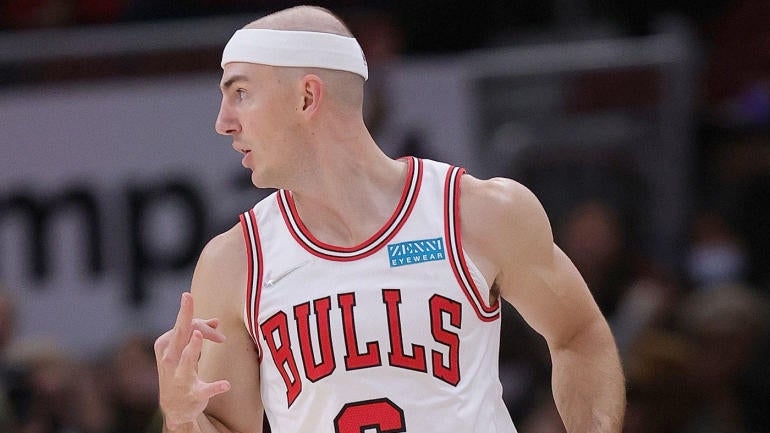
Alex Caruso made it clear throughout the buildup to 2021 free agency that he wanted to remain with the Los Angeles Lakers. The fit was obvious. He'd come up through their G League system to emerge as one of the better role players in basketball. He'd won a championship in purple and gold. Over several seasons, virtually every statistic suggested that he had great chemistry with LeBron James. He was, in essence, exactly the sort of supporting piece a team built around multiple superstars needed: an elite defender, a connecting passer and an improving shooter.
Yet when free agency arrived, Caruso signed with the Chicago Bulls. He went on JJ Redick's "Old Man and the Three" podcast to explain his decision and revealed that the Lakers just didn't make him a compelling offer.

CBS Sports HQ Newsletter
Your Ultimate Guide to Every Day in Sports
We bring sports news that matters to your inbox, to help you stay informed and get a winning edge.
Thanks for signing up!
Keep an eye on your inbox.
Sorry!
There was an error processing your subscription.
"So going into it I really didn't know what to expect, and I really didn't hear much from any team including the Lakers leading up to 6 p.m., and then they called and the Lakers made their offer, and it wasn't an offer I was gonna accept because I was gonna get considerably more money from another team," he revealed. "Like we just said, a guy who hasn't had a lot of decision-making power, fought for a job, essentially 30 teams told me they didn't think I was good enough to play in the NBA for two or three years. I need to get as much money, this is real life we're talking about. I need financial security for me, for my people."
This part of the story was almost obvious. If the Lakers had made Caruso a respectable offer, he'd likely still be in Los Angeles right now. But as he explained, after getting the offer he received from the Bulls, he went back to the Lakers to see if they'd match it. They wouldn't even come close.
"I got on the phone with AK [Arturas Karnisovas] and with Billy [Donovan], and the way they were talking about how they wanted to play, how they saw me as a player, I thought they hit the nail on the head," Caruso said. "I thought everything they said, I was like 'I think that's accurate, I think that's what I bring to the table, I think that's how I can help this team win, I think that's the direction this team wants to go.' I thought there was a need for the stuff that I had. So essentially we got that offer, went back to L.A., asked if they could do the same, they said no, asked for something else that was a little bit less, they said no. I said OK, if that's what it comes to, I'm ready to go to Chicago and start the next chapter."
Now here's where things get especially frustrating for Lakers fans. Redick then offered a guess at what the Lakers initially offered Caruso and asked the Bulls guard to blink once if his guess was over what they were willing to pay and twice if it was under. That guess was two years and $15 million. Caruso blinked once and the two started laughing.
Our guy Alex Caruso (@ACFresh21) on what exactly happened In free agency that led him to The Chicago Bulls.
— TheOldMan&TheThree (@OldManAndThree) November 10, 2021
Full episode w/ Alex drops tomorrow. Subscribe here: https://t.co/3wGZq3EszW pic.twitter.com/U7EqsAgz9q
While we don't know exactly how many years the Lakers were willing to guarantee, those figures fit with what has been previously reported. ESPN's Ramona Shelburne said after the fact that the Lakers were only willing to go as high as $7 million per year. A two-year, $15 million offer would have been for $7.5 million annually. The Bulls not only went above $9 million per year, but gave him a four-year pact with the first three years fully guaranteed. No matter how badly Caruso may have wanted to remain in Los Angeles, taking the offer Shelburne described would have been irresponsible. She added that he would have been willing to return on a three-year, $30 million deal, but the Lakers declined.
As Bleacher Report's Eric Pincus recently laid out, retaining Caruso at the price the Bulls paid him would have cost the Lakers $33 million in salary and taxes. There were cheaper ways to go about retaining him, though. Let's say, for instance, the Lakers had chosen to re-sign Caruso but eschew the taxpayer mid-level exception, which they gave to Kendrick Nunn. That would have cost them a more manageable $17 million more in salary and taxes. As pricey as that figure seems, the Lakers would still be paying their roster far less than rivals like Golden State and Brooklyn.
But either figure was apparently too pricey for a Lakers team that earns an estimated $150 million per year in local television revenue alone. The Lakers ultimately decided that Caruso wasn't worth whatever price he was asking them for, and they're paying the price for that decision defensively. After ranking first on that end of the floor last season, the Lakers have fallen to 14th this year despite one of the easier opening schedules in basketball. Their full and healthy roster hasn't played yet this season, but it's hard to imagine any version of this team that Caruso couldn't have helped. The 7-3 Bulls, tied with the Miami Heat and Washington Wizards for the No. 1 seed in the Eastern Conference, would certainly agree. At this point, Caruso looks like a downright bargain.


















